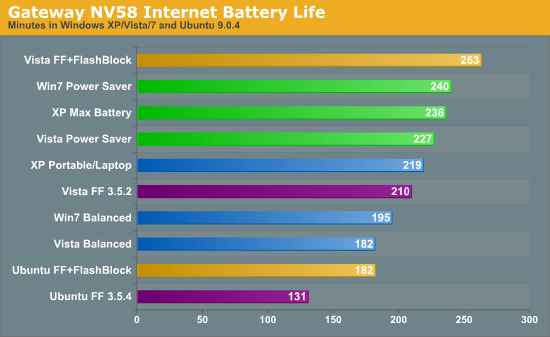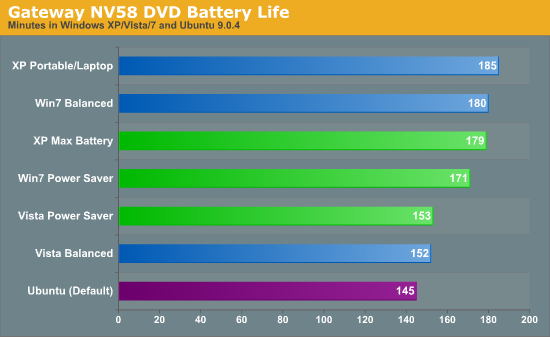Gateway NV58 (Intel) - Battery Life
We first looked at AMD's mobile platform with several operating systems and now it's Intel's turn. Once again, here's the rundown of specifications followed by the results, starting with battery life.
| Gateway NV5807u Test System | |
| Processor | Intel Core 2 Duo T6500 (Dual-core, 2.1GHz, 2MB shared L2, 45nm, 35W, 800MHz FSB) |
| Memory | 2x2048MB Micron PC2-5300 @ DDR2-667 5-5-5-15 (Micron Technologies 16HTF25664HY-667G1) |
| Graphics | Integrated Intel GMA 4500MHD Driver version 15.13.4.64.1829 10 Shaders at 475 MHz |
| Display | 15.6" Glossy WXGA (1366x768) LG LP156WH2-TLE1 |
| Hard Drive | HITACHI Travelstar 5K500.B 320GB 5400RPM 8MB (HTS545032B9A300) |
| Optical Drive | 8x DVDRW (TSST Corp TS-L633B) |
| Battery | 6-Cell 10.8V, 4400mAhr, 47.5Whr |
| Operating System | Windows Vista Home Premium 64-bit |
| Price | NV5814u available online starting at $580 |


If you expected the standings to remain the same regardless of computer hardware, you might be in for a bit of a surprise by the above charts. This time, Windows XP wins in both DVD playback results, providing better battery life using the "Portable" profile than the "Max Battery" profile. Windows 7 also performs slightly better on DVD playback using the Balanced profile, whereas we saw virtually no difference between the power profiles using the NV52.
Why is Balanced beating Power Saver this time? Intel's SpeedStep technology appears to be better than AMD's PowerNow!, though minor differences in drivers may also contribute to the standings. The theory is that letting your CPU run at 100% for a short time and then returning to minimum power draw as fast as possible results in the best battery life, which is why setting the maximum CPU state to 50% isn't always the best idea. Intel CPUs are supposed to switch between C-states faster than AMD CPUs, or so we've heard, and these results seem to support that idea. However, the Internet battery tests again all favor the power saving profiles by a large margin, so power saving profiles can have a positive impact, just not in DVD playback. Ubuntu brings up the rear in both battery life tests once again.
Internet battery life shows different standings on the three Windows operating systems compared to the NV52. Windows 7 is just 2% ahead of XP and 6% ahead of Vista with the power saving profile; switch to the balanced profile and XP jumps into the lead offering 12% more battery life than Windows 7 and 20% more battery life than Vista. Looking at the profiles, Windows XP shows the smallest change by using a power saving profile, improving by 8% when using the Max Battery option. Windows 7 and Vista both improve by around 25% (23% for Windows 7). That means all three Windows OSes did better in Internet battery life with power saving profiles relative to the NV52.
Our testing with Ubuntu once again requires a bit of explanation. First, LCD brightness adjustment did not work properly under Ubuntu (with the drivers we used), with the final setting ending up at 150 nits instead of 100 nits. That means battery life is going to be slightly lower because the LCD is consuming an extra 1-2W. Second, unlike the NV52, we didn't experience any difficulties with DVD playback - hooray! Internet performance using Firefox still feels horribly slow in comparison to Firefox or Internet Explorer on Windows, and while blocking Flash content helps we still prefer Windows.
Enabling FlashBlock with Firefox again has a substantial impact on battery life; Vista improves by 25% - the same as on the NV52 - and Ubuntu improves by 39% - slightly less of an improvement compared to the NV52. The gap between Vista and Ubuntu is still huge, even bigger than on the NV52. Without FlashBlock, Firefox on Vista offers 60% more battery life than Firefox on Ubuntu. Even with FlashBlock, the gap remains at 45%, which is far more than the Power Saver profile offers.
Overall, Windows XP leads in best-case battery life for DVD playback on the Intel platform, providing 3% more battery life than Windows 7 - not a huge difference. The gap between Windows 7 and Vista is much larger, with the best-case Windows 7 result being 18% higher than the Windows Vista scores. Ubuntu almost matches Windows Vista, and it might even match Vista if we could modify the LCD brightness.










106 Comments
View All Comments
Kibbles - Tuesday, September 22, 2009 - link
If all you have is a killawhat meter then that'll be pretty inaccurate. Not just because of the 1W accuracy but also measuing at the outlet you are also including the inefficiency of the powersupply.However I do agree that using the battery is throwing an extra variable into your equation. How big is it? I don't know. But I do know they don't always charge to the same capacity, and their capacity changes overtime.
I don't know if it's possible, but I would think the best option would be to have a DC source modded into the battery connection. Then measure the #W-h used. You would probably need a good variable DC supply and voltmeter to do this (maybe borrow it from the powersupply setting team?). Even then I don't know if you can do that, I think my laptop has like 6 pins on the battery. There's probably some connection for charging, some for battery status, and then the discharge connections.
The second option I see is putting a voltmeter on the DC-out side of the powersupply going into the laptop. You could run the benchmark without the battery for an equivalent duration and see if the W-h is close.
n0nsense - Tuesday, September 22, 2009 - link
Power savings in Ubuntu are far from optimal.I was more than surprised to see that even very basic features may or may not work.
For example on my Gentoo box each core frequency scaled separately.
On Ubuntu some processors are not supported. After all I thought that engineers at Canonical have better kernel understanding than me.
As for the tests, dim option is helping with battery life.
I don't remember such difference in battery life from my experience. Both Linux and windows where capable of ~3Hr on my laptop.
From my very personal point of view, Ubuntu is sluggish. I compared Ubuntu, XP, 7, Debian and Gentoo performance on IBM X31 with 1GB ram.
It started without Gentoo (It takes a while to setup fully optimized Gentoo box). Ubuntu and 7 where (IMHO only)the slowest. Debian and XP where just fine. But since I wanted more, i did the Gentoo thing. It was more than worth it.
With Ubuntu it was overall sluggish feeling (some tests will show much better performance under it than in windows). But feeling is important when you use something. Even more important than some numbers.
7 ... Same sluggish Vista with facelift and few tweaks that can be manually done.
Watching icons drawn few seconds after menu displayed was more than enough. It is more stable, can work longer without reboots, but nowhere faster than XP.
Debian with Gnome was nice so was XP. Anyway I'd stay with Linux since it's more customizable and have few useful things that make me feel handicapped in Windows.
Gentoo once again convinced me that it worth each second (it took more than 2 days on X31. should be much faster on any dual/quad core CPU and/or using distcc). But, not everyone can do it. Even "experienced" Ubuntu/Fedora/Suse (or whatever mainstream distro) may find that his understanding of "how staff works" is not on the required level.
Anyway it's quiet a change to see Linux participating in review.
Good job guys :)
lordmetroid - Tuesday, September 22, 2009 - link
I'll be running Arch Linux on my nettop, I tried gentoo 4 years ago from stage 1 and that was a nightmare to get installed. Maybe I should try it again but Arch Linux seems to be more interesting at this point as it had many of the packages I want in its repositories that I couldn't find in gentoo.stmok - Tuesday, September 22, 2009 - link
Running Arch Linux here on my ThinkPad T43...Much better than Ubuntu.Ubuntu feels bloated. Heck, even Xubuntu feels bloated.
void2 - Tuesday, September 22, 2009 - link
30..40 seconds to boot WinXP on modern CPU? That's sad. I get 7..8 seconds (boot menu to desktop, add your machine POST time yourself) on a comparable CPU (Athlon 64 X2 3800+). Clean OS, no SSD, no messing around with disabling services etc. How? Use Boot Cooler (www.bootcooler.com). It is free.lyeoh - Tuesday, September 22, 2009 - link
Why should anyone use bootcooler? The website doesn't even say what the program is _supposed_ to do, and how it achieves it. I don't see much on the web that describes or tests what it _actually_ does (as opposed to just claims), the limitations etc.It could be a trojan for all we know.
void2 - Tuesday, September 22, 2009 - link
If you haven't noticed, the website is under construction. Detailed explanation of how Boot Cooler works is included in readme.txt (in short - disk reads prefetching). And of course there are no reviews yet - the project is still in beta.orionmgomg - Tuesday, September 22, 2009 - link
I love antech - waiting for the radeon hd 5870 info to hit - looking at this artical - something about your battery lasting longer on your lap top...WHO CARES!!!
Give me a brake - you spend so much time on analizing minutes of extra juice it a fly is in the room or not! WHO CARES?
Plug your lap top in the wall - dont expect it to last any longer than it does when you have a full charge and it runs out of juice.
Once you know how long it lasts - realize your screwed - or should I say attached to the power cord!
Oh - did I mention - who cares?
Thanks for all your other articals!
orionmgomg - Tuesday, September 22, 2009 - link
I love Anandtech*^JarredWalton - Tuesday, September 22, 2009 - link
If you haven't figured it out, I'm the mobile reviewer at AnandTech, and my articles are about mobility. Writing articles about laptops doesn't mean I'm delaying any CPU or GPU reviews -- unless they happen to be mobile CPUs/GPUs. If you don't care about laptops, you don't need to read most of my articles, but please don't make the mistake of assuming no one cares. When people use a laptop on the road and don't have a chance to plug in, articles like this are very useful. If you never use a laptop, great; some people do and that's my target audience.